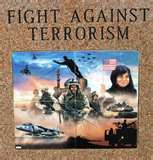THE assault by terrorists on a naval aviation base in Karachi has once again demonstrated the amount of the roots of terrorism in the country.
Even if the attackers did not have sympathizers and informants inside, the way they carried out the assault shows they had an active network in neighboring areas and an operational cell through which they managed to procure heavy weapons and carry them into the naval base. The same can be said of other high-profile terrorist attacks targeting safety forces throughout the country, including the October 2009 attack on GHQ in Rawalpindi.
Even if the attackers did not have sympathizers and informants inside, the way they carried out the assault shows they had an active network in neighboring areas and an operational cell through which they managed to procure heavy weapons and carry them into the naval base. The same can be said of other high-profile terrorist attacks targeting safety forces throughout the country, including the October 2009 attack on GHQ in Rawalpindi.
The spread and reach of terrorists in Pakistan has become a critical challenge for the state. The attacks that they have launches have shown that they are capable of striking anywhere in the country. And yet ambiguity remains pervasive in society on the issue of terrorism. The group mindset reflects a state of out-and-out denial.
Almost every religious organization, whether its ambitions are political, sectarian or militant, maintains wings with a specific focus on women, lawyers, traders, doctors and teachers, among others.
Almost every religious organization, whether its ambitions are political, sectarian or militant, maintains wings with a specific focus on women, lawyers, traders, doctors and teachers, among others.
International terrorist organizations, such as Al Qaeda, have also benefited from this level of radicalization, by generates financial and human resources as well as cultivating favorable perceptions among the populace in some parts of the country. According to an Asia Online report, numerous hundred students from Karachi affiliated with the student wing of an offshoot of a religious political party have joined Al Qaeda training camps in North Waziristan Agency in Fata. The report described that as a more hazardous development for Pakistan than any previous Al Qaeda alliance, as student wings can boast Al Qaeda’s recruitment drive and enhance its political power. In mainland Pakistan, however, terrorism has its roots in the ideological, political and sectarian narratives developed by the religious parties, aggressive groups and, at times, by the state itself.




